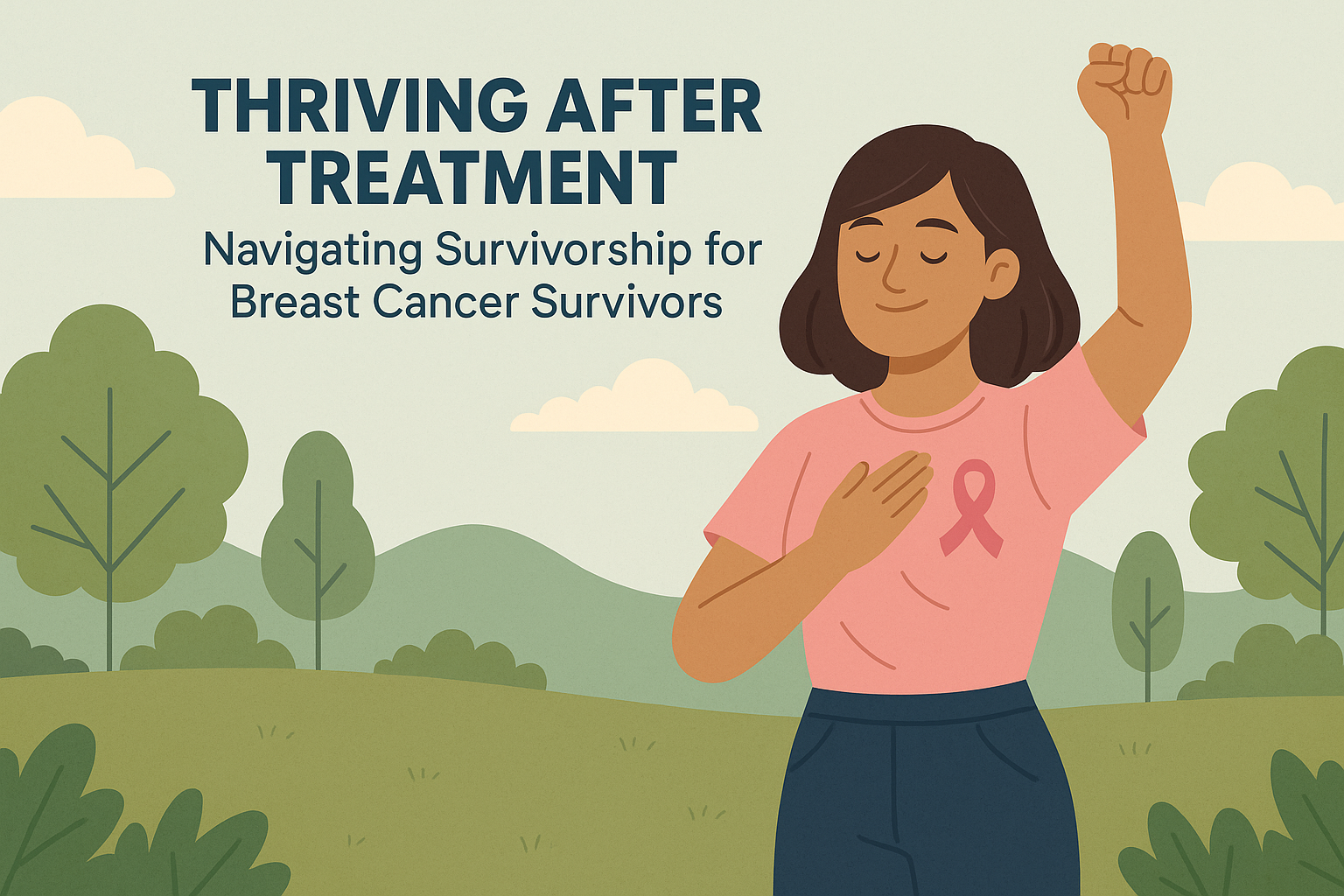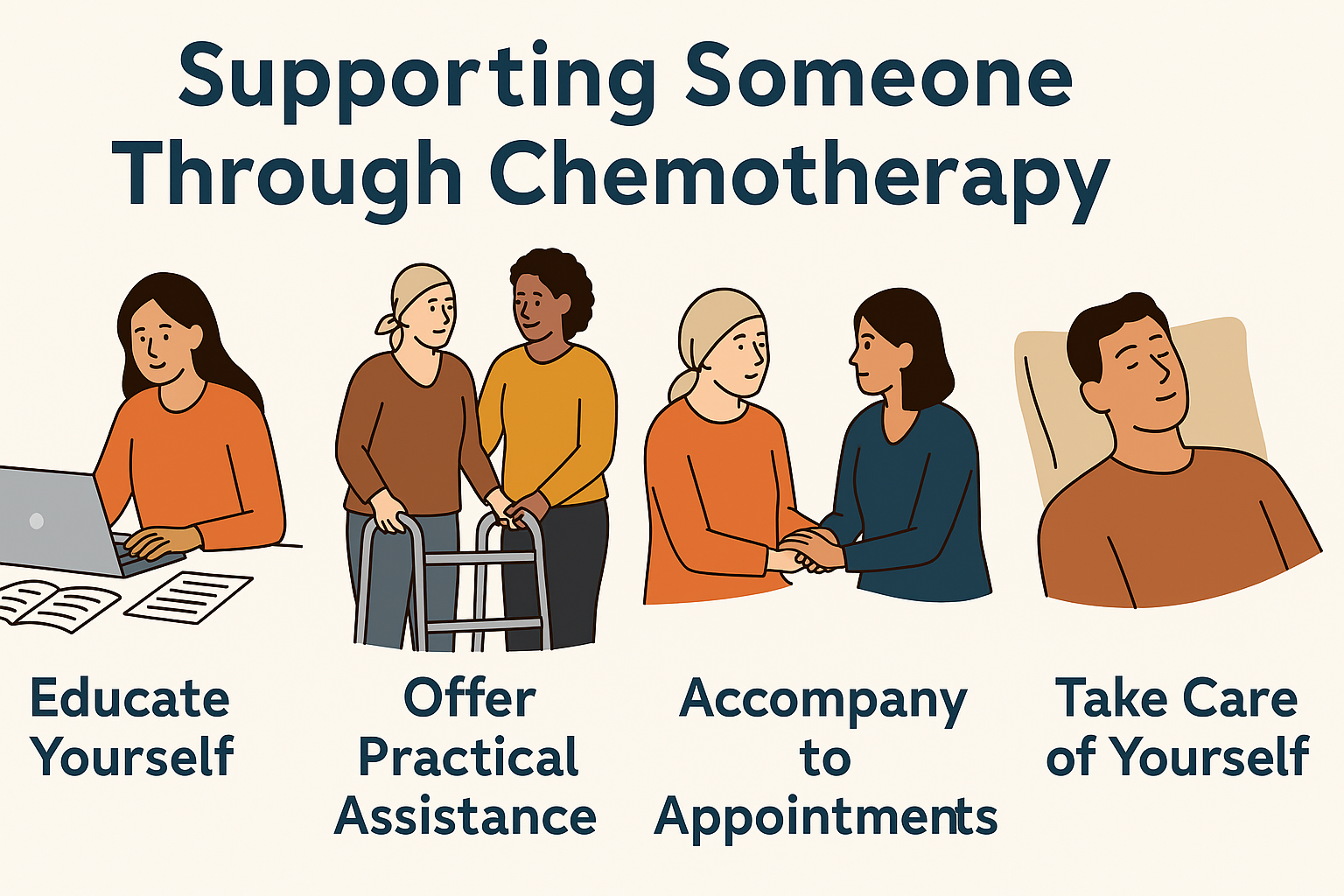Book Appointment Now

Thriving After Treatment: Navigating Survivorship for Breast Cancer Survivors
Introduction
Completing active treatment for breast cancer – whether it involved surgery, chemotherapy, radiation, hormone therapy, or targeted therapy – is a significant milestone. It marks the beginning of a new chapter: survivorship. However, the journey doesn’t end with the last treatment session. Breast cancer survivors often face a unique set of long-term physical, emotional, and practical challenges.
This article aims to provide guidance and support for navigating this phase, focusing on strategies to manage late effects, nurture emotional well-being and embrace a healthy lifestyle to truly thrive after breast cancer.
Understanding Breast Cancer Survivorship
Survivorship encompasses the period from the time of diagnosis through the rest of a person’s life. It includes not only those who are cancer-free, but also those living with stable disease. For breast cancer survivors, this phase can bring a mix of relief, hope, and new concerns. It’s a time to redefine life after cancer and focus on long-term health and well-being.

Managing Potential Late Effects
- While treatments are designed to eradicate cancer, they can sometimes have long-lasting side effects, known as late effects. These can emerge months or even years after treatment completion. It’s crucial for survivors to be aware of these potential issues and to communicate any concerns with their healthcare team. Some common late effects of breast cancer treatment include:
- Fatigue: Persistent tiredness that doesn’t improve with rest. Strategies include pacing activities, gentle exercise and addressing underlying causes like anemia or sleep disturbances.
- Lymphedema: Swelling in the arm or chest area due to damage to the lymphatic system. Management involves specialized exercises, compression garments, and manual lymphatic drainage.
- Neuropathy: Nerve damage causing numbness, tingling, or pain in the hands and feet, often related to chemotherapy. Management may involve medication and physical therapy.
- Bone Health Issues: Increased risk of osteoporosis or osteopenia due to hormone therapy or chemotherapy. Regular bone density scans and lifestyle modifications like weight-bearing exercise and adequate calcium and vitamin D intake are important.
- Cardiovascular Issues: Some treatments can affect heart health. Regular monitoring and a heart-healthy lifestyle are often recommended.
- Cognitive Changes (“Chemo Brain”): Difficulties with memory, concentration, or multitasking. Strategies include cognitive exercises, stress management, and organizational tools.
- Pain: Chronic pain can persist after surgery or radiation. A multidisciplinary approach involving pain specialists, physical therapy, and alternative therapies may be beneficial.
- Sexual Health Issues: Changes in libido, vaginal dryness, or pain during intercourse, often related to hormone therapy. Open communication with healthcare providers can lead to effective management strategies.
Nurturing Emotional Well-being
The emotional impact of breast cancer can be profound and long-lasting. Survivors may experience:
- Fear of Recurrence: Anxiety about the cancer returning is common. Regular follow-up appointments and open communication with the medical team can help manage this fear. Support groups and therapy can also provide valuable coping strategies.
- Body Image Issues: Changes due to surgery (mastectomy, lumpectomy), hair loss, or weight fluctuations can affect self-esteem and body image. Support groups, counseling, and connecting with other survivors can be helpful.
- Anxiety and Depression: The trauma of diagnosis and treatment can lead to anxiety and depression. Seeking professional help from therapists or counselors specializing in cancer survivorship is crucial.
- Grief and Loss: Survivors may grieve the loss of their pre-cancer self, their sense of normalcy, or the physical changes they’ve experienced. Allowing space for these feelings and seeking support is important.
- Post-Traumatic Growth: While challenging, the experience of cancer can also lead to personal growth, a renewed appreciation for life, and a stronger sense of purpose. Focusing on positive changes can be empowering.
Embracing a Healthy Lifestyle
Adopting healthy habits can significantly contribute to long-term well-being after breast cancer:
- Balanced Nutrition: A diet rich in fruits, vegetables, whole grains and lean protein can support overall health and energy levels. Consulting with a registered dietitian specializing in oncology can provide personalized guidance.
- Regular Exercise: Physical activity, tailored to individual abilities, can help manage fatigue, improve mood, maintain bone health, and reduce the risk of recurrence. Aim for a combination of aerobic and strength-training exercises, with guidance from a physical therapist if needed.
- Stress Management: Finding healthy ways to cope with stress, such as mindfulness, yoga, meditation, or spending time in nature, is essential for both physical and emotional health.
- Adequate Sleep: Prioritizing restful sleep is crucial for recovery and overall well-being. Establishing a consistent sleep routine and addressing any sleep disturbances is important.
- Avoiding Smoking and Limiting Alcohol: These habits can increase the risk of recurrence and other health problems.
- Regular Medical Follow-up: Adhering to the recommended schedule of follow-up appointments and screenings is vital for detecting any potential recurrence early and managing long-term health.
Connecting with the Survivor Community
Connecting with other breast cancer survivors can provide invaluable emotional support, practical advice, and a sense of not being alone. Support groups, online forums, and survivor networks offer opportunities to share experiences, learn coping strategies, and build meaningful connections.

Conclusion
Thriving after breast cancer treatment is a journey that requires ongoing attention to physical and emotional well-being. By understanding potential late effects, prioritizing emotional health, embracing a healthy lifestyle, and connecting with the survivor community, breast cancer survivors can navigate this phase with resilience and hope, embracing a full and meaningful life beyond cancer. Remember that you are not just a survivor; you are a thriver. Don’t hesitate to reach out to your healthcare team and support networks for guidance and encouragement along the way



